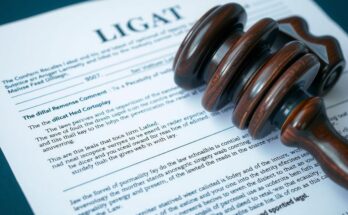On February 12, former UN High Commissioner for Human Rights, Mary Robinson, delivered a poignant address to 800 attendees at Florida State University College of Law, part of their international human rights speaker series. Her speech traversed vital issues, including ongoing conflicts such as those in Ukraine and Gaza, while underscoring the importance of the rule of law in the context of climate change and human rights. Robinson’s commitment to human rights led to her presidency at Ireland and later her pivotal role in the UN, where she was appointed Commissioner in 1997.
Robinson profoundly articulated that the rule of law is essential, especially in these increasingly turbulent times. This concept, she explained, ensures that all individuals and entities are accountable under laws that uphold human rights standards. She highlighted the disheartening reality that many global citizens are experiencing a decline in the rule of law, pointing to staggering statistics from 2023, where civic participation, freedom of assembly, and freedom of expression worsened significantly worldwide.
She stressed that historical and current actions, particularly from the United States, underline an urgent need to fortify respect for the rule of law. Robinson lamented the retreat from international law exemplified by the U.S.’s withdrawal from crucial treaties, suggesting that such actions legitimize a governance style that prioritises power over principles of justice. This disillusionment, she warned, feeds divisions and complicates efforts for global security and human rights.
Connecting climate change with human rights, Robinson pointed out the legal protections necessary for climate activists and highlighted a growing trend of climate litigation. She noted that youth activists are increasingly mobilising the legal system to hold governments accountable. Notably, Robinson expressed optimism over recent legislative developments recognising the right to a healthy environment at national and international levels, indicating a paradigm shift towards integrating environmental protection within human rights frameworks.
Robinson acknowledged the pressing need for more comprehensive actions to address climate change impacts, which she associates with existing human rights violations. The European Court of Human Rights ruling reflected a notable step towards acknowledging governmental obligations to combat climate change. In her conversations, she encouraged integrating environmental rights within national laws to foster substantial human rights outcomes and hold businesses to account regarding environmental standards.
While recent frameworks like the EU’s due diligence directive provide a pathway towards greater corporate accountability for sustainability, Robinson cautioned against potential erosions of these standards. She decried the backlash against Environmental, Social, and Governance (ESG) criteria, urging leaders to champion human rights over corporate power. Robinson concluded her address with an inspirational note from Nelson Mandela, emphasising persistence in the face of daunting challenges, stating, “it always seems impossible until it is done.”
Mary Robinson, former UN High Commissioner, spoke at FSU about the rule of law and its critical relevance to human rights and climate change. She highlighted the declining global state of the rule of law and the U.S.’s detrimental actions affecting it. Robinson advocated for integrating environmental rights within human rights frameworks, urging support for climate litigation and corporate accountability. Her message emphasised ongoing global efforts needed to overcome the challenges presented by governance reliant on power rather than law.
Mary Robinson’s address at FSU highlights the intricate relationship between the rule of law, climate change, and human rights. She poignantly illustrates the urgent need for global accountability and the pivotal role of legal frameworks in safeguarding these rights. By integrating environmental considerations into human rights discourse, Robinson advocates for a more just world where the rule of law prevails, guiding both governance and individual actions towards a sustainable future.
Original Source: www.forbes.com



